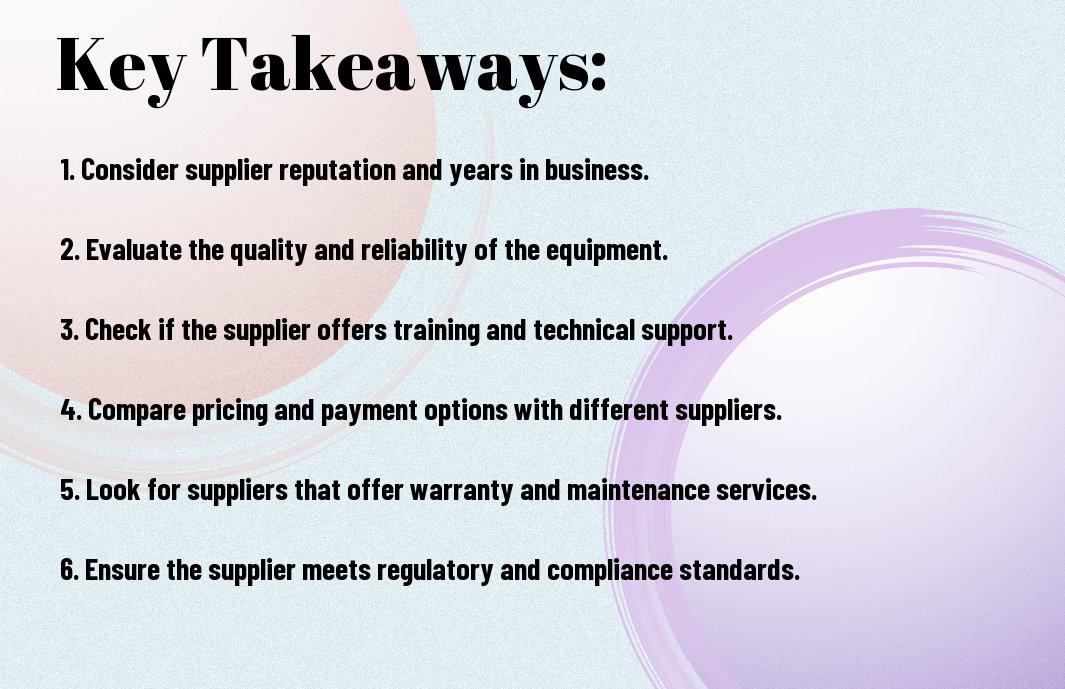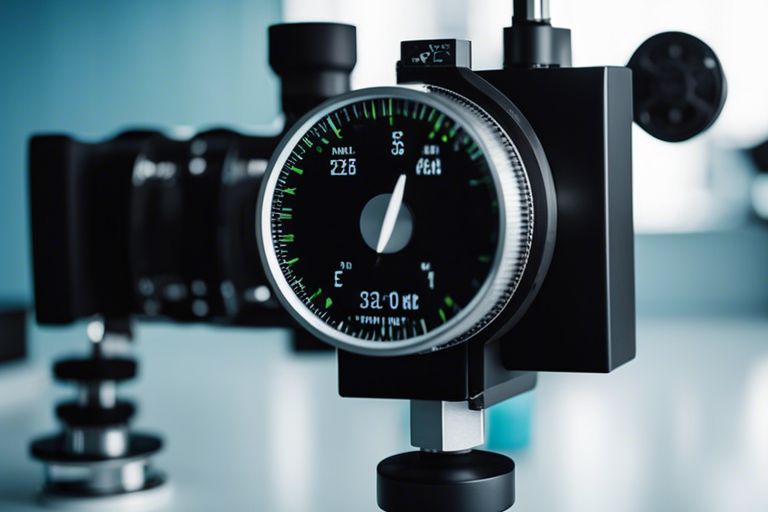Over the years, the importance of selecting the right medical equipment supplier has become increasingly vital in the healthcare industry. In this comprehensive guide, we will investigate into the 7 best tips to consider when choosing a medical equipment supplier. From assessing quality standards and certifications to evaluating customer service and delivery timelines, these tips will help healthcare professionals make informed decisions that ultimately impact patient care and overall operations.
Key Takeaways:
- Research thoroughly: Before selecting a medical equipment supplier, ensure to research extensively on their reputation, products, and customer reviews.
- Quality over price: Prioritize quality when choosing a supplier as it directly impacts patient care and outcomes.
- Check for certifications: Verify that the supplier meets industry standards and has necessary certifications to ensure compliance and safety.
- Consider after-sales support: Look for a supplier who provides excellent after-sales services such as maintenance, repairs, and training.
- Build a long-term partnership: Choose a supplier who is willing to work collaboratively and build a lasting relationship based on trust and reliability.


Research and Due Diligence
The process of selecting a medical equipment supplier requires thorough research and due diligence to ensure that you are partnering with a reputable and reliable company. By conducting proper research, you can make an informed decision that will benefit your practice in the long run. Here are some tips to help you with your research and due diligence.
Verify Licenses and Certifications
The first step in your research is to verify the licenses and certifications of the medical equipment supplier. This will give you confidence that the company meets the necessary regulatory requirements and operates within industry standards. Check if the supplier is properly licensed to sell medical equipment and if they hold any certifications that demonstrate their commitment to quality and safety. By verifying these credentials, you can ensure that you are dealing with a reputable and trustworthy supplier.
Furthermore, it is important to confirm that the supplier’s licenses and certifications are up to date. This will help you avoid any legal or compliance issues down the line. A thorough verification process will give you peace of mind and the assurance that you are working with a professional and reliable supplier.
Pertaining to medical equipment, quality and reliability are paramount. By verifying the licenses and certifications of the supplier, you can make an informed decision that will benefit your practice and your patients. Don’t overlook this crucial step in your research and due diligence process.
Check Online Reviews and Ratings
One of the most effective ways to assess the reputation of a medical equipment supplier is by checking online reviews and ratings. Platforms like Google, Yelp, and specialized medical equipment forums can provide valuable insights into the experiences of other customers. Look for reviews that mention the quality of the equipment, the level of customer service, and the overall satisfaction with the supplier.
For instance, if a supplier has consistently positive reviews and high ratings, it is a good indicator that they are dependable and trustworthy. On the other hand, if you come across several negative reviews or complaints about the quality of the equipment or the customer service, it may be a red flag to consider other options. Online reviews can give you a comprehensive understanding of the supplier’s reputation and help you make an informed decision.

Evaluate Product Quality and Range
Any wise medical equipment buyer knows that the quality and range of products offered by a supplier are crucial factors to consider. When evaluating a supplier, it is crucial to assess the types of medical equipment they offer. A reputable supplier should have a wide range of products to choose from, catering to various medical specialties and needs. This ensures that you can find everything you need from a single source, saving time and effort in sourcing equipment from multiple suppliers.
- Check if the supplier offers crucial medical equipment such as defibrillators, ECG machines, patient monitors, and infusion pumps.
- Look for specialized equipment like imaging systems, surgical tools, and respiratory devices to meet specific department requirements.
- Ensure that the supplier provides maintenance and support services for the equipment they offer.
- Verify if the supplier partners with top manufacturers to guarantee the quality and reliability of their products.
- Consider if the supplier offers customization options to tailor equipment to your facility’s unique needs.
Any buyer should also pay attention to the product features and specifications of the medical equipment offered by a supplier. It is crucial to inspect the details of each product to ensure it meets the necessary standards and requirements. By thoroughly examining the features and specifications, you can determine if the equipment is suitable for your facility and meets the needs of healthcare professionals and patients. Plus, understanding the product features can help you make informed decisions when comparing different options available in the market.
Specifications play a significant role in determining the functionality and performance of medical equipment. By reviewing the specifications of each product, you can assess important factors such as accuracy, sensitivity, durability, and user-friendliness. Plus, comparing the specifications of multiple products can help you identify the best option that aligns with your facility’s requirements and budget constraints. It is crucial to pay attention to the details to ensure that the medical equipment you choose will deliver optimal results and provide reliable performance in a clinical setting.
Assess Supplier Reliability and Support
After reading the comprehensive guide on selecting medical equipment suppliers titled How to Find the Right Medical Equipment Supplier, it is necessary to assess the reliability and support offered by potential suppliers. Trustworthiness and a commitment to excellent customer service are crucial factors to consider when choosing a supplier for your medical equipment needs.
Evaluate Response Time and Customer Service
The responsiveness of a supplier can significantly impact your operations. Quick response times to inquiries or issues can prevent delays in patient care and ensure that your facility runs smoothly. Assess how promptly a supplier replies to your initial inquiries and whether they provide comprehensive answers to your questions. Additionally, evaluate their customer service by seeking feedback from other clients to gauge their satisfaction levels. A supplier that is attentive to your needs and provides exceptional customer support can be a valuable partner in your healthcare delivery process.
Check Warranty and Maintenance Options
Any medical equipment you purchase should come with a warranty to protect your investment. When evaluating potential suppliers, inquire about the warranty options they offer for the equipment you are interested in. A comprehensive warranty can provide you with peace of mind knowing that any issues with the equipment will be promptly addressed. Additionally, consider the maintenance options available from the supplier. Regular maintenance is necessary to ensure the proper functioning and longevity of your medical equipment. A supplier that offers maintenance services or can recommend trusted technicians will be beneficial in keeping your equipment in top condition.
Check with the supplier if they provide on-site maintenance or if you need to send the equipment to a service center. Understanding the maintenance process and associated costs upfront can help you make an informed decision when selecting a supplier. Remember that reliable warranty and maintenance options are critical factors in ensuring the efficiency and longevity of your medical equipment.
Consider Cost and Value
For
Compare Prices and Discounts
On your quest to find the best medical equipment supplier, it’s crucial to compare prices and discounts offered by different companies. This can help you make an informed decision based on your budget and the value you will receive. Create a table with two columns: one for the price of the equipment and the other for any discounts or promotions available. This will give you a clear picture of the costs involved and potential savings.
| Price of Equipment | Discounts & Promotions |
| $10,000 | 10% off for bulk orders |
| $8,000 | Free shipping on orders over $5,000 |
By comparing prices and discounts, you can ensure that you are getting the best value for your money and potentially save on costs.
Calculate Total Cost of Ownership
Compare the total cost of ownership for the medical equipment you are considering. This goes beyond just the initial purchase price and includes factors such as maintenance, training, and potential upgrades. By calculating the total cost of ownership, you can make a more informed decision about which supplier offers the best value in the long run.
Plus, considering the total cost of ownership can help you avoid any unexpected expenses down the line and ensure that you are investing in high-quality equipment that will meet your needs for years to come.
What Factors Should I Consider When Selecting a Medical Equipment Supplier?
When selecting a medical equipment supplier, quality should be the top priority. Consider factors such as the supplier’s reputation, certification, and track record for providing reliable and durable equipment. Ensure they meet industry standards and regulations to guarantee the highest level of medical equipment supplier quality.
Conclusion
Considering all points discussed in this article, selecting a reliable medical equipment supplier is a crucial decision that can impact the quality of care provided to patients. By following the seven best tips outlined here, healthcare facilities can ensure that they partner with a supplier who offers quality products, excellent customer service, and reliable support.
It is important for healthcare providers to conduct thorough research, ask for references, and visit supplier facilities to evaluate their operations firsthand. Building strong relationships with suppliers based on trust and communication can lead to long-term success and improved patient outcomes. By implementing these tips, healthcare organizations can streamline their procurement process and enhance the overall efficiency of their operations.
Ultimately, the selection of a medical equipment supplier should be guided by a commitment to delivering high-quality care and staying up-to-date with the latest advancements in technology. By prioritizing factors such as product quality, regulatory compliance, and after-sales support, healthcare facilities can ensure that they are well-equipped to meet the needs of their patients and provide the best possible care.
FAQ
Q: Why is selecting the right medical equipment supplier important?
A: Selecting the right medical equipment supplier is crucial because it can impact the quality of patient care, operational efficiency, and overall financial health of a healthcare facility.
Q: How can I assess the quality of medical equipment supplied by a vendor?
A: To assess the quality of medical equipment supplied by a vendor, you should look for certifications, customer reviews, warranty information, and the vendor’s track record in the industry.
Q: What are the key factors to consider when selecting a medical equipment supplier?
A: Key factors to consider when selecting a medical equipment supplier include product quality, pricing, customer service, after-sales support, and the vendor’s ability to meet regulatory requirements.
Q: How can I ensure that the medical equipment supplier complies with industry regulations?
A: To ensure that the medical equipment supplier complies with industry regulations, you should ask for documentation of certifications, standards compliance, and quality control processes.
Q: Is it important to establish a long-term relationship with a medical equipment supplier?
A: Yes, establishing a long-term relationship with a medical equipment supplier can lead to better pricing, improved support, and a deeper understanding of your facility’s needs, leading to a more efficient and effective partnership.



